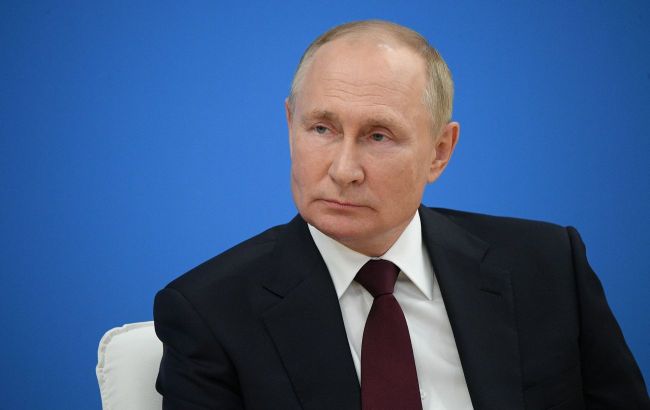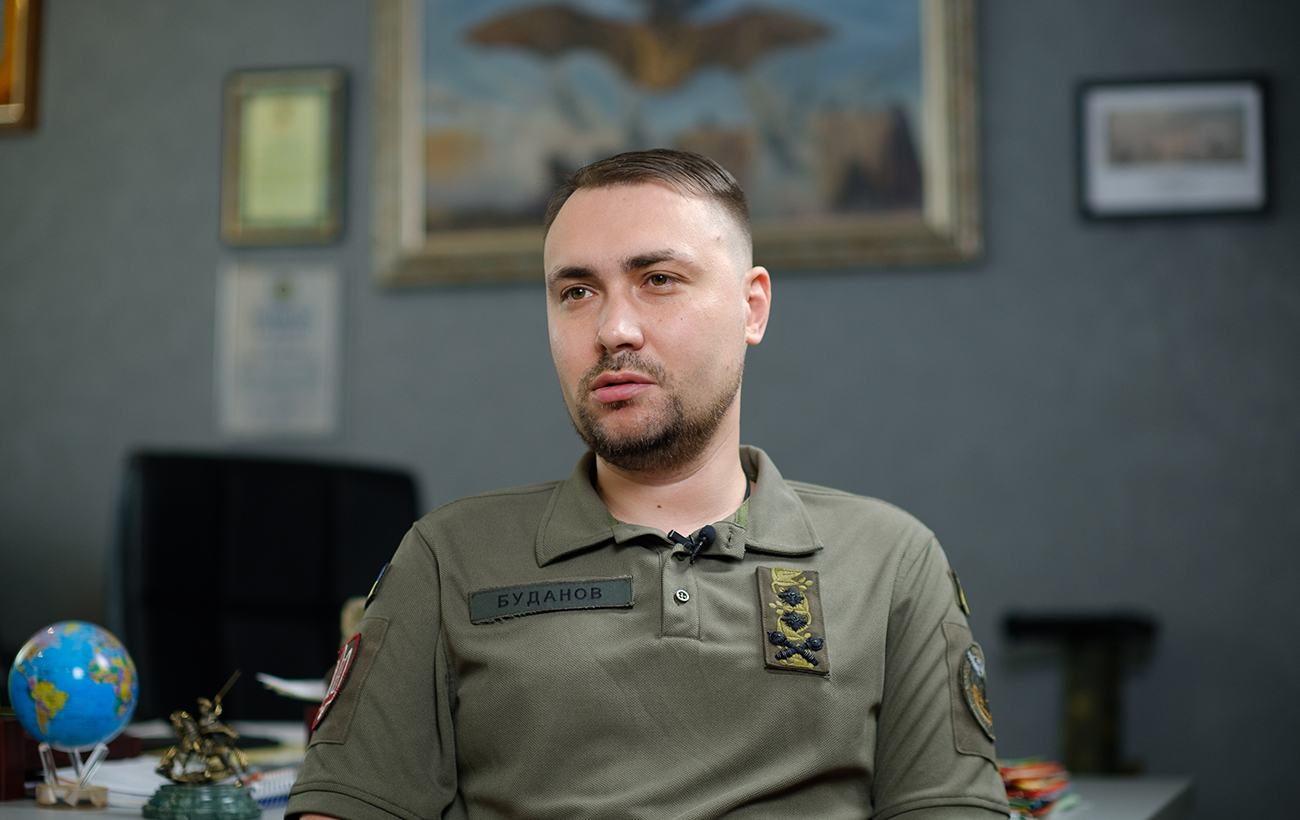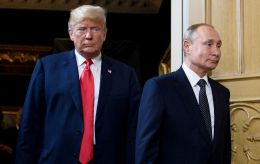No Russian 2025 war plan? Analysis of Putin's battle endurance by experts and Ukrainian Intelligence
 Ukrainian intelligence says that Vladimir Putin currently has no plans for war after 2024 (Photo: Getty Images)
Ukrainian intelligence says that Vladimir Putin currently has no plans for war after 2024 (Photo: Getty Images)
Ukrainian military believes that Vladimir Putin currently has no plans for war in 2025. This contradicts sources in German intelligence reported by BILD, claiming that Russia intends to reach a line from Kharkiv to the Dnipro within three years.
More details about Russian plans and how they are assessed by military and experts can be found in the material by RBC-Ukraine.
The article was prepared based on statements from the Chief of the General Staff of the Armed Forces of Ukraine Kyrylo Budanov, material from Bild, the final press conference of Vladimir Putin, comments from the representative of the Defense Intelligence of Ukraine Andrii Cherniak, and military expert Oleksandr Musiienko.
Is there no Russian plan for 2025? What do the military and experts say?
Recently, a discussion panel dedicated to the challenges of 2024 was held in Kyiv. The military aspects were commented upon by the Chief of the Defense Intelligence of the Ministry of Defense, Kyrylo Budanov.
"I can say only one thing: as of now, the Russian Federation does not have plans to wage a war in 2025. Maybe by the end of 2024, if nothing changes, they will adjust it. But for now, they do not have such plans," he stated.
According to him, Russians have serious problems, not so much with the support for the idea of war, as the opinion of the average Russian doesn't matter, but rather with resources.
"This war is very costly. And the resources there are not unlimited. Perhaps it sounds a bit crude, but we fight with other people's money, while they fight with their own. And they count their own money, although it may seem like they don't. And very meticulously," Budanov added.

Photo: Kyrylo Budanov says that Russia currently does not have a military plan for 2025 (Vitalii Nosach/RBC-Ukraine)
RBC-Ukraine reached out to Ukrainian Intelligence for comment. According to the intelligence representative Andrii Cherniak, a significant part of the so-called Russian elite doesn't want war, but that doesn't mean Russia won't engage in it. Apparently, the Kremlin intends to continue the war at least throughout the next year.
"Russians are actively restructuring the economy, aligning it with military needs, transitioning the entire country into a state of war, and exerting maximum effort to achieve some result. All this, combined with Kremlin's aggressive rhetoric, indicates that Russians are not ready to stop the war," he notes.
The head of the Center for Military-Legal Research, Oleksandr Musiienko, agrees: currently, Russian troops are at the peak of offensive actions, and they need a break, hence Moscow's planning horizon is limited to 2025. During this time, they hope to outlast the West, counting on fatigue, disruptions in military supplies, and financial support for Ukraine to make concessions.
The strategy of the Russian Federation appears as follows: firstly, the war must continue on Ukrainian territory; secondly, there's a focus on controlling the already occupied territories; thirdly, conducting local offensive actions that could maximize tactical advantages. In other words, do everything to prevent Ukraine from entering its new extensive offensive phase.
"Essentially, they are preparing their supplies and forces for this strategy. And then they will act based on the external political situation, the outcome of the U.S. presidential elections, the stability of support from North Korea, Iran, and possibly China. And they will act accordingly regarding military actions. Of course, globally, Russians would be willing to advance further and occupy even more territories. But for that, they need time to recover," the expert adds.
Seizing Kharkiv, Dnipro, and Zaporizhzhia by the end of 2026. How realistic is this?
BILD analyst Julian Röpke, citing sources in German intelligence, writes about Russia's medium-term war plan until the end of 2026.
According to this plan:
- By the end of 2024, the occupiers want to fully capture the Donetsk and Luhansk regions, as well as reach the Oskil River in the Kharkiv region (i.e., advance along the Lyman-Kupiansk axis).
- By the end of 2026, they aim to gain control over large territories in the east, seizing Zaporizhzhia, Dnipro, and Kharkiv.
- In the south, the Russians intend to maintain defense along the Dnipro without advancing to Kherson or Odesa.
"All eastern territories on the left bank of the Dnipro must be conquered within 36 months,” reported an intelligence source. Then the river will become the new front," the source noted.
Additionally, according to German intelligence, the Russian side is ready to lose up to 100,000 military personnel annually.
 Photo: The German publication BILD obtained a Russian war plan until the end of 2026 (bild.de)
Photo: The German publication BILD obtained a Russian war plan until the end of 2026 (bild.de)
Representative of the Ukrainian Defense Intelligence, Andrii Cherniak, emphasizes that the adversary previously had plans to capture Ukrainian cities. If an opportunity arises to occupy new ones, they will do so.
"However, based on our assessments, they lack the strength to occupy our cities. Human resources are one thing, but occupation and maintenance require much more than mobilized inexperienced soldiers. They have voiced their grandiose goals for several years, but none have been achieved," he tells RBC-Ukraine.
Currently, the situation in the Kremlin is deadlocked. Russian authorities have declared the occupied territories as part of the Russian Federation, but de facto, this is not the case, and in their attempt to achieve something, they will continue to sacrifice human resources.
"Yes, they don't count people in Moscow, but they count money. They have enough financial resources for war until 2025. And then we'll see," concludes Cherniak.
Undoubtedly, a plan until the end of 2026 may be on Vladimir Putin's desk. Especially considering the report from the German Society for Foreign Policy (GDAP), stating that Russia will be ready for war with NATO in six years, says Oleksandr Musiienko.
According to German experts' report, after the end of the war, Russia will need no more than 10 years to prepare for an attack on NATO. The economy has shifted to military tracks, arms and equipment production is increasing, and Russia can annually train up to 280,000 soldiers. Thus, within six years before the war, an army of almost 1.7 million people will be prepared, and within ten - 2.8 million.
"All of this fits into a general canvas; perhaps the German intelligence received information about similar plans. But these are just plans. There was a plan to establish control over Kyiv and Ukraine in 2022. It was not implemented. Plans can vary, the question is whether they can be implemented. Regarding the capture of cities like Kharkiv and Dnipro, I have serious doubts," Musiienko notes.
At the same time, the article by BILD is a cause for concern. This publication in December 2021 detailed a full-scale invasion plan by Russia, with the capture of bridges and the siege of cities. The maps showed the progress towards the south, east, and Kyiv, and BILD almost correctly predicted the timing.
"But I want to mention another point. When the Russians were seizing Bakhmut, they said the next point would be Dnipro. They also talked about Zaporizhzhia and Sumy. All these plans exist, they are discussed, and they have been known for a long time. Clearly, such risks exist. That they may try to do it, there are no doubts, but can they achieve the necessary result? I doubt it. If we look at the front, if the Russians have any success, it is only of a tactical nature. Certainly not operational or strategic," emphasizes the expert.
Is Putin preparing for a major offensive? Why does he need hundreds of thousands of contractors?
A press conference was held in Moscow recently. Among other things, Russians were curious about when the war would end, and part of the questions was dedicated to Ukraine. Putin once again emphasized that the "special operation" would only end after all goals were achieved.
"Peace will come when we achieve our goals. They haven't changed - denazification of Ukraine, its demilitarization, and its neutral status," he said.
Fantasizing about demilitarization, Putin complained about Western arms supplies but cynically warned that "the freebie may soon end." And in his characteristic manner, he repeated the thesis about fraternal peoples and supposed civil war.

Photo: Vladimir Putin claimed to have recruited up to half a million contractors for the war against Ukraine (Getty Images)
Compared to the beginning of the full-scale invasion and the current situation, the declared goals haven't changed. However, perhaps only Putin knows the ultimate goal of "demilitarization and denazification," what exactly he'll place within these concepts, and what he might declare as a victory in the war against Ukraine. He doesn't explicitly voice the desire to capture the entire Ukraine, though during the press conference, a map of Russia was shown with occupied Ukrainian regions.
"The goal is adjusted considering the capabilities of the Russian forces on the ground. The main one seems clear – to prolong the war as much as possible. At least throughout 2024," specifies Olekasndr Musiienko.
Another aspect concerns the number of enemy troops and how many more people Putin is ready to put under arms. Judging by Putin's statements, there are 617,000 soldiers along the 2000-kilometer front line. According to this year's results, they supposedly managed to recruit up to half a million contractors.
In particular, within the announced autumn mobilization of 2022, they recruited 300,000 individuals. After this, the recruitment of contractors began. They planned to enlist 412,000, but apparently, around 486,000 "volunteers" were recruited. It seems Putin either has inaccurate figures or is intentionally misleading.
The representative of the Ukrainian Defense Intelligence, Andrii Yusov, has stated that inflated data provokes informational pressure on Ukraine, intimidates its partners, and attempts to motivate Russians. In reality, not more than 450,000 Russians are involved in the war.
"That's not the number spoken by the person resembling Putin yesterday. Unless they counted all the eliminated aggressors whom the Russians didn't retrieve from the battlefield. In that context, a different figure might have emerged. In general, it's propaganda," he shares.
In any case, the figures are impressive but can be assessed in terms of effectiveness. For instance, Putin claims that only a few hundred Ukrainian soldiers oppose Russian forces on the left bank of the Kherson region. There are around 60,000 Russian troops, a tenth of what the dictator proclaimed, Musiienko analyzes.
"This raises the question: if there are 60,000 there, why haven't they displaced our forces to the right bank yet? This poses a significant question about the enemy's readiness to conduct assault operations. On many fronts today, they appear as infantry assaults supported by mortars, sometimes artillery. There's a problem with drones; they've increased the use of Lancets, FPV, and it's indeed challenging for us. Tactical breakthroughs near some villages can be achieved through such attacks. But to conduct large-scale actions and capture major cities, this is insufficient; fire support is needed," the expert highlights.
Hence, Russia needs a respite to replenish, regroup, and accumulate resources during winter and spring. Engaging "half a million" individuals within a year shouldn't be seen as preparation for major events in 2024.
"They will conduct offensive operations along the entire front line. Localized and limited in scope. These won't be massive attacks (like in 2022 - Ed.), Russians are unlikely to prepare for significant breakthroughs. Most likely, next year will continue the trends of the present," Musiienko concludes.

